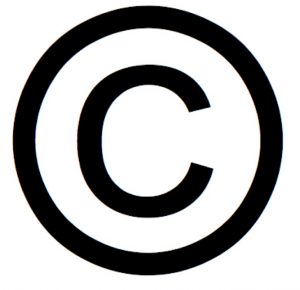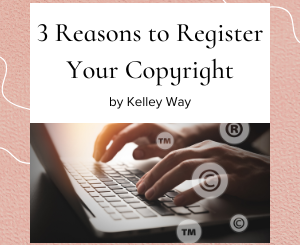To register or not to register your copyright by Literary Lawyer, Kelley Way
 Welcome back to our regular column on literary law. Today we focus on whether of not to register your copyright from our monthly guest columnist, Kelley Way, a lawyer specializing in literary law. If you have general questions for Kelley on copyright or other aspects of literary law, be sure to comment below. Thanks!
Welcome back to our regular column on literary law. Today we focus on whether of not to register your copyright from our monthly guest columnist, Kelley Way, a lawyer specializing in literary law. If you have general questions for Kelley on copyright or other aspects of literary law, be sure to comment below. Thanks!
PS. A list of books on literary law can be found here.
PPS. For more on copyright, visit the U.S. Copyright Office.
And now for a bit of necessary legalese: Please note that this article does not constitute legal advice, and that an attorney-client relationship is not formed by reading the article or by commenting thereon.
***
To register or not to register…
Copyrights and trademarks are very different. One protects your work, while the other protects your reputation. A sentence is almost impossible to copyright, but it can easily be trademarked. On the other hand, they have a lot in common. Both exist to allow you to profit from something you worked to create. Both can be obtained without having to file a form with the government. And both really deserve to have that form mailed in.
But why? I just said you can get a copyright or trademark without it. And do we really want the government to be a big know-it-all? Yes, we do, and here’s why.
First of all, the Copyright Office and the Patent and Trademark Office can be very useful tools for writers. You can check to see if a work is still under copyright before you quote it in your book (this is more useful for pre-1978 books, but I covered that in an earlier article; just assume that any work created after 1978 is copyrighted). You can also check to see if the title of your book is trademarked before you put it on the market. This will save you a lot of time, stress and money if you should end up on the receiving end of an infringement lawsuit. In order for this system to be effective, though, these offices need authors to register their works with them; they’re not going to reach out and find you.
And second, if your copyright or trademark is registered with the appropriate office, then if you should be in a position to sue someone else, not only do you have a more solid case, but you will also be entitled to statutory damages if you win. Let me elaborate.
By registering your copyright or trademark, you have established that it is valid, because the government has determined that the necessary requirements have been met and has rubber-stamped it. A very common defense to infringement is that the plaintiff’s copyright/trademark isn’t valid, so there’s no infringement. With the government’s stamp of approval, the defendant has the burden of proving his claim; without it, the plaintiff has to go on the defensive and prove the validity of his copyright/trademark. In addition, it sets down a solid timeline for the existence of your copyright/trademark.
In infringement cases, it can be important to know whose copyright/trademark came first, since a person can’t have infringed if his copyright/trademark existed before yours. However, if his came much later, then the likelihood of infringement is much higher.
Now, if your copyright/trademark is unregistered and someone infringes, it’s not the end of the world. You have to register before you can sue, and then the case proceeds normally. However, by being proactive and registering before there’s a problem, if the court should find infringement, the defendant has to pay a statutory fine, in addition to a fine for the actual damage done to the plaintiff. In other words, not only does the defendant have to compensate you for lost revenue, he also has to pay a fine determined by law.
The idea is that by registering, you have put the world on notice that you have the rights to this work/name, and are willing and able to enforce them. If the defendant had done his homework and checked the copyright or trademark registry, he would have known he’d be infringing, and thus, he deserves to pay a hefty fine for being either ignorant or willfully disrespectful of your rights.
Let’s look at this from a story perspective. Say you have two writers, Mary and Sue. Mary did all the research up front on how to protect her rights, and she registered her copyright as soon as her book was finished. Sue, on the other hand, considered herself lucky to finish the book at all, and jumped straight into publishing without registering anything. Both of them are sued by other authors, claiming that Mary and Sue infringed on their books. Mary promptly hired a good lawyer, who showed the court Mary’s copyright certificate and pointed out that it was dated a full year earlier than the plaintiff’s. The court looked at it and ruled in Mary’s favor, ending the case before it even got to trial.
Sue, on the other hand, couldn’t find a good lawyer, and represented herself, telling the judge at the trial that she wrote her book before the plaintiff wrote his, even if the book was published later and she had no proof. The judge didn’t buy it, and he reminded her that the plaintiff’s book was registered and on the market long before hers, and their books were suspiciously similar. In the end, the plaintiff won, and poor Sue had to pay compensation for lost revenue, the plaintiff’s attorney fees, and statutory damages in the tens of thousands. Mind you, this is a worst-case scenario, but even if Sue was successful, she’d still have had the time, frustration and expense of a trial to deal with, while Mary never got much farther than the initial complaint.
So there you have it, three reasons why you should register your copyrights and trademarks:
- To support the system that you can and should use yourself;
- To put everyone on notice of your rights to the work/name, should you sue or be sued; and
- To open the door for statutory damages, if you should sue and win.
As always, questions, comments, and angry tirades can go in the comment box below.
***
ABOUT THE AUTHOR
 Kelley Way was born and raised in Walnut Creek, California. She graduated from UC Davis with a B.A. in English, followed by a Juris Doctorate. Kelley is a member of the California Bar, and an aspiring writer of young adult fantasy novels. She can be contacted at KelleyAWay@gmail.com. You can contact via your comments below or email her directly to set up a consultation.
Kelley Way was born and raised in Walnut Creek, California. She graduated from UC Davis with a B.A. in English, followed by a Juris Doctorate. Kelley is a member of the California Bar, and an aspiring writer of young adult fantasy novels. She can be contacted at KelleyAWay@gmail.com. You can contact via your comments below or email her directly to set up a consultation.







What happens if you never got the copyright paperwork filed but sent the original documents to yourself and now retain them in a sealed envelope?
This can still prove you were the original writer, can it not?
Wonderful, and very informative blog! Thank you for sharing this information and relaying the importance of registering their work. Very well done!
Hi Bonnie,
Thanks for reading! Yes, copyright application materials can be used to establish authorship and the date of creation, they just don’t hold the same weight as a certificate of registration.
Another reason to register copyright: registration certificate needed to bring infringement suit: http://www.law.cornell.edu/uscode/text/17/411